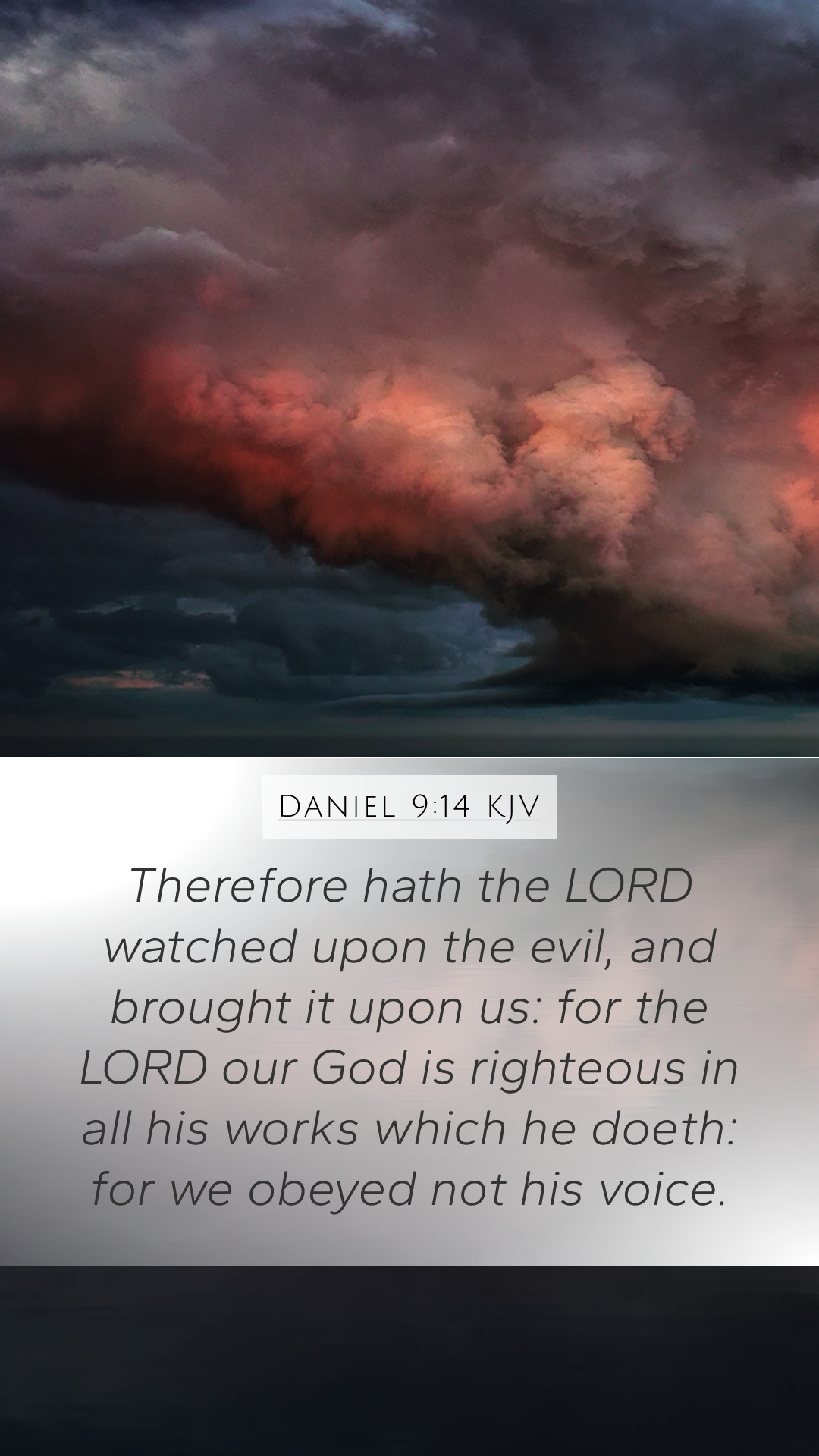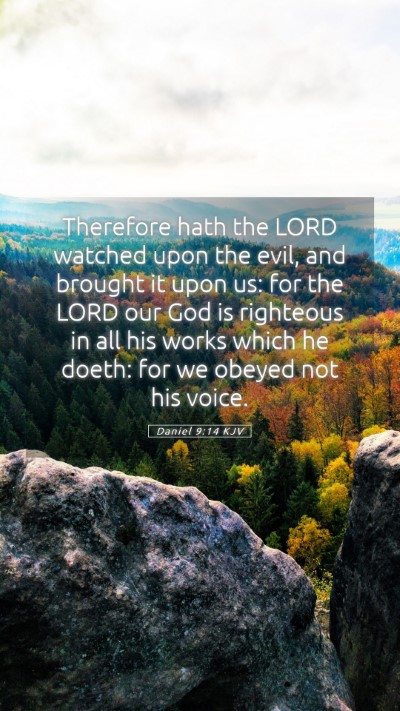Bible Verse Commentary on Daniel 9:14
Understanding Daniel 9:14
Daniel 9:14 states:
"Therefore hath the LORD watched upon the evil, and brought it upon us: for the LORD our God is righteous in all his works which he doeth: for we obeyed not his voice."
This verse encapsulates a profound moment in the Book of Daniel, representing a recognition of God's righteousness amidst human disobedience. It reflects Daniel's understanding of God’s justice and the consequences of sin. Below is an analysis based on insights from notable public domain commentaries.
Meaning and Interpretations
This section delves into the deeper meanings of the verse.
- Recognition of Divine Sovereignty: Daniel acknowledges that it is the LORD who has allowed the calamities to come upon His people. This reflects a key aspect of biblical theology which asserts God's sovereignty over human affairs.
- Righteousness of God: The assertion that "the LORD our God is righteous" emphasizes the idea that God acts justly. Both Matthew Henry and Adam Clarke elucidate that God's dealings with Israel, even when severe, are grounded in His moral perfection.
- The Role of Human Responsibility: The mention of disobedience is crucial. Albert Barnes comments on the necessity of recognizing one’s own failings as a prelude to seeking divine mercy. The people’s failure to heed God’s voice warranted their suffering.
Biblical Exegesis and Insight
When evaluating Daniel 9:14 through the lens of biblical exegesis, the following points emerge:
- Historical Context: This prayer of confession and supplication by Daniel occurs in the context of Israel’s Babylonian captivity. The historical backdrop helps understanding of why Daniel reflects on their collective sin.
- Theme of Confession: This verse stands as part of Daniel's penitential prayer which underscores the need for confession in approaching God. Matthew Henry emphasizes humility before God as essential in seeking forgiveness and restoration.
- Applying the Verse to Daily Life: The contemporary application invites believers to consider their own lives in light of God's righteousness, encouraging a spirit of repentance and recognition of personal and communal sins.
Commentary and Analysis
In-depth commentary on the specifics of the verse reveals additional insights:
- God's Vigilance: "The LORD hath watched upon the evil" indicates God’s attentiveness to moral decay and injustice—an assurance that He sees our circumstances and is at work even when it seems otherwise.
- Judgment as a Reflection of Justice: God’s bringing calamity upon His people is not arbitrary but rather a reflection of His justice. Adam Clarke remarks on how God's acts are impartial and align with His promise of blessings for obedience and consequences for disobedience.
- Call to Action: Recognizing our failures is crucial for spiritual renewal, as pointed out by Barnes, who adds that acknowledgment of guilt is the first step toward restoration.
Related Bible Cross References
- Deuteronomy 28:15-68: The blessings and curses articulated here parallel the theme in Daniel of consequences for disobedience.
- Lamentations 3:33-39: This passage emphasizes God’s justice and the need for repentance, echoing sentiments found in Daniel's prayer.
- Isaiah 40:27-31: Highlighting God’s greatness and the importance of understanding His ways in times of trouble, it complements the reflections found in Daniel.
Conclusion
Understanding the meaning of Daniel 9:14 involves recognizing God’s sovereignty, righteousness, and our call to repentance. This verse serves both as a historical reflection and a timeless reminder for individuals and communities to assess their relationship with God. Engaging in Bible study groups or utilizing online Bible study resources can illuminate further insights into this important scripture.
For those seeking deeper Bible study insights, it is beneficial to embrace a comprehensive approach to understanding Scripture, utilizing various Bible study tools and guides available. A potent method would include in-depth Bible verse analysis and discussions regarding the historical context of Bible verses such as Daniel 9:14.


